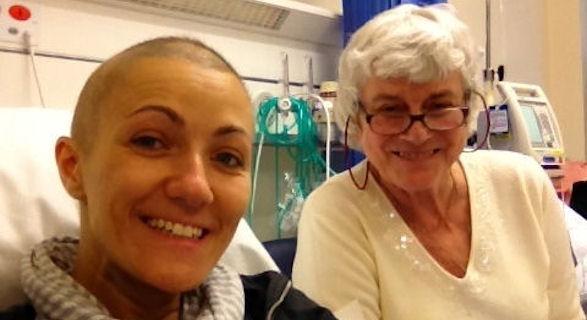Helen - Carol's mum
When Helen’s daughter Carol was diagnosed with Hodgkin lymphoma, she wanted her Mum with her. Helen learnt a lot about lymphoma and has since become a buddy to support other parents going through similar experiences.
You can hear Carol share her lymphoma story on our BBC Radio 4 Appeal which raised funds to provide the support that Helen found so essential.

In 2004 our daughter Carol said she had a lump on the side of her neck. She had left home and was pursuing a busy freelance musical career, living 150 miles away.
I began to get to know the train line between us, going to hold Carol’s hand while she went through tests. She is and always will be, a hospital phobic and wanted Mum with her when she went through anything. I’m a retired occupational therapist so am accustomed to hospital procedures, but knowing more didn’t make me any less anxious, spending many nights awake and worrying over the years to come.
Carol had been diagnosed with Hodgkin lymphoma. In most cases this is helped into remission with around 6 months of chemotherapy. However, Carol was different and her lymphoma proved to be partially chemo-resistant.
In most cases Hodgkin lymphoma is helped into remission with around 6 months of chemotherapy. However, Carol was different and her lymphoma proved to be partially chemo-resistant
As a phobic this all seemed pretty unfair. Carol kept me busy zooming between our home and hers over several years. I learnt a lot about her condition. Any booklets she was given were handed straight over; Carol simply didn’t want to know! She relied on me to find out and tell her as needed, and for me to be able to ask her various consultants anything that needing answering.
She went through tougher, rescue chemo and an autologous stem cell transplant using her own stem cells, During this, Carol was at risk of infection so spent a while in isolation in a special hospital room. This proved tough and I stayed with her every day, sleeping in her room. This was followed by radiotherapy to the large node in her chest.
A CT scan later showed that the chest node, though smaller, was still there. This was in 2005, before PET scans were around. So she was referred to a specialist hospital that were carrying out clinical trials.
The consultant and his team there got to know us all - Carol, her housemate, me, my husband and Carol’s brother too - pretty well over several years while she went through various trials, the third of which got her into remission in 2011.
That final trial drug, though it had worked so well, did not have a long history, so it was not known how long Carol’s remission would last. Her consultant advised an allogeneic transplant, using donor stem cells. This type of transplant is long and difficult.
Carol took some time agonising over this, now needing even more comfort as well as information. We all said that though happy to gain the information she needed, it had to be her decision alone. She should never have any regrets about what she decided.
She wanted the chance of a long life, so decided to go ahead. Tissue typing had already been done and she had 3 donors. Carol was given many drugs, some chemo, a drug to suppress some of her white cells, together with anti-rejection drugs. The transplant actually took place on 21 September 2011, with me holding Carol’s hand and helping sort out bowls and tissues as she was sick.
All the staff were wonderful over the month that Carol spent there, and have been ever since, during the times she had to be readmitted with infections. The graft took a while to thoroughly take over, for Carol’s blood type to change, so regular red cell transfusions were needed (thank-you to all blood donors!) around once every three weeks.
It is a long and continuing story, Carol is still at risk of infection, but still in remission and now in regular contact with her German donor. In February 2016 we both had a very emotional weekend. Carol arranged to meet her donor Thomas in Berlin. At first I said she should meet him alone for the first time, but she insisted that she wanted me there.
Carol said that as she opened the apartment complex door to him, both of them had huge grins on their faces. They hugged, cried a little and then she brought him up to the fourth floor to the flat when I too, met the man who had saved our daughter’s life. To say that it was overwhelming is to put it mildly, it was a phenomenal experience and one that I will remember for the rest of my life. I am so humbly grateful to have been asked to accompany Carol.
As a family this whole experience has brought us even closer. As her Mum, I am overwhelmed with the support that Lymphoma Action has given us, especially the empathy over the phone when sometimes I just simply cried.
I belong to the local Lymphoma Action Support Group and am really happy to have been accepted as a Lymphoma Action Buddy to be able to encourage other parents or carers facing a long and challenging period of illness like Carol’s.
Note from Dr Graham Collins via the transplant team in Oxford:
After 2 years patients can ask to meet their donor. They need to formally apply and there may be instances where the registry don’t allow this, for example if the donor isn’t keen.
June 2017
